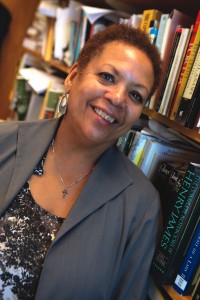I’m really excited by the “Building on the Block” plan’s commitment to eliminating program fees for blocks abroad. I’ve had the opportunity to teach several blocks abroad, and I have seen firsthand the impact of the experience on students, especially those who come from families with limited resources and who have rarely had opportunities to travel outside their own communities. While traditional semester abroad programs have a lot to offer, CC’s unique block system allows students to have shorter term but nonetheless rich and focused experiences.
 Since 2005, I have been regularly teaching a class on black writers in Paris. Before taking this class, many of my students had been unaware that for the first decades of the 20th century, Paris was a center of the black diaspora where African, African American, Caribbean, and Latin American artists, intellectuals, students, writers, and entertainers encountered one another. Important political and artistic ideas such as Négritude and Caribbean surrealism were launched here among the conversations, periodicals, and performances that took place in cafés, salons, and lecture halls. From the American slaves who came to Paris to get an education denied to them in the United States, to the architects of the New Negro movement, to the jazz artists who charmed the French, to the African and Antillean francophone colonial subjects who, inspired by their encounters with other intellectuals from the Black Diaspora, returned to their native countries to loosen the bonds of colonialism, to the alienated young Arabs and Africans burning cars in the suburbs in 2005 and 2007, the city of Paris has played a central role in black diasporic culture, discourses of identity and freedom, and global conversations between black intellectuals. We walk the historic streets, explore museums, cultural sites, and monuments of the city which has symbolized all the promises and betrayals of humanism, modernism, and urban culture. In conversations with African American, Antillean, and African expatriate writers and artists — usually in their favorite cafés — we gain insight into the work of writers such as Langston Hughes, Aimé Césaire, the Nardal sisters, Claude McKay, and Cheikh Hamidou Kane, as well as into still simmering debates about the power of literature, the legacies of colonialism, diasporic culture, the values of humanism, and social justice.
Since 2005, I have been regularly teaching a class on black writers in Paris. Before taking this class, many of my students had been unaware that for the first decades of the 20th century, Paris was a center of the black diaspora where African, African American, Caribbean, and Latin American artists, intellectuals, students, writers, and entertainers encountered one another. Important political and artistic ideas such as Négritude and Caribbean surrealism were launched here among the conversations, periodicals, and performances that took place in cafés, salons, and lecture halls. From the American slaves who came to Paris to get an education denied to them in the United States, to the architects of the New Negro movement, to the jazz artists who charmed the French, to the African and Antillean francophone colonial subjects who, inspired by their encounters with other intellectuals from the Black Diaspora, returned to their native countries to loosen the bonds of colonialism, to the alienated young Arabs and Africans burning cars in the suburbs in 2005 and 2007, the city of Paris has played a central role in black diasporic culture, discourses of identity and freedom, and global conversations between black intellectuals. We walk the historic streets, explore museums, cultural sites, and monuments of the city which has symbolized all the promises and betrayals of humanism, modernism, and urban culture. In conversations with African American, Antillean, and African expatriate writers and artists — usually in their favorite cafés — we gain insight into the work of writers such as Langston Hughes, Aimé Césaire, the Nardal sisters, Claude McKay, and Cheikh Hamidou Kane, as well as into still simmering debates about the power of literature, the legacies of colonialism, diasporic culture, the values of humanism, and social justice.
Many students have told me that this class, which could only be taught in Paris, has been transformative. One student wrote: “[T]his class did justice to the complexity of [the racial issue] and all of the complications surrounding race and identity in France. It also unexpectedly led me to really reflect on American identity, more so than I had before.”
It’s very important that the college commit itself to making sure that all Colorado College students can have these sorts of experiences in the growing number of exciting new blocks abroad classes that are being offered by many departments.
Claire Garcia is professor of English.